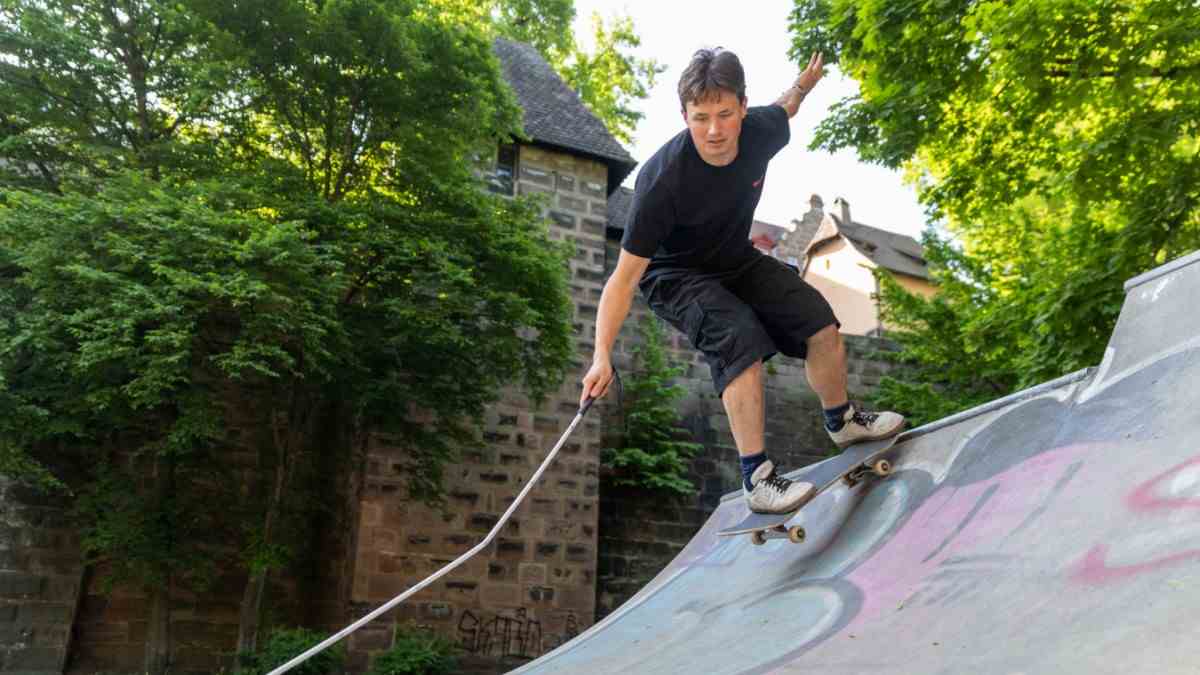Johannes Bruckmeier is 27 years old, a skateboarder – and blind. When he speeds through town with a skateboard and white cane or practices in the skate park, people stop. “The reactions are the same everywhere,” he says. “Mostly something like “Boa, blatant”. Meanwhile, selfies are also being added, which I find strange.” He doesn’t find it particularly special that he skateboards despite his disability. “For me it’s the most normal thing in the world.” Johannes Bruckmeier has retinitis pigmentosa, a hereditary disease in which the cells in the retina gradually die off. According to the self-help association Pro Retina in Germany, 30,000 to 40,000 people suffer from one of the various forms.
An operation at the age of six prevented Johannes Bruckmeier from progressing further. “I have a field of vision of five degrees, which corresponds to the diameter of a toilet paper roll. I am legally blind with it.” He struggled with his disability for a long time, says Bruckmeier. He tried to conceal this or cover it up with humor. When a relationship broke up four years ago, he started skateboarding. “And I’ve been at it ever since, for several hours every day. I also align my whole life with it.” On the weekends, Bruckmeier is always out and about competing in competitions and skating in other inner cities. And otherwise he spends every free minute on the skateboard.
Like on this morning, before starting work as a physiotherapist, he does a few laps in a skate park in Nuremberg’s moat – always with the cane first. This is badly bent because Bruckmeier fell over garbage while driving in the city center, which he says was left behind from a cultural event. “From time to time it happens that I drive over something that I didn’t see. That’s a risk I’m taking,” says Bruckmeier. Especially when skating, he has problems with contrasts and has to rely on his other senses. He has also suffered one or two injuries: the scars from the operation are still clearly visible on his upper arm. In September he broke it in a contest. Two weeks later he was back on his skateboard, says Bruckmeier. This morning, too, he immediately jumps up again when he falls – and first does ten push-ups. “As punishment for my lack of concentration,” he says and grins.
Bruckmeier is an exception in the skater scene
The skate park is almost empty at such an early hour, just another skateboarder practicing her tricks there. Bruckmeier and she greet each other briefly as they come to a stop next to each other on a ramp. Then everyone continues to do their rounds. Of course, people in Nuremberg know him. Nevertheless, he is an exception in the skate scene. To his knowledge, there are only nine blind skaters worldwide who are on a relatively professional level, says Bruckmeier. One of them is the American Dan Mancina, who regularly posts videos of his tricks on Instagram. In a video on YouTube, he says that skating is not difficult because of his disability. “It’s generally difficult.”
The Brazilian Felipe Nunes also gets a lot of applause on the internet for his skate videos: Since an accident, he has lost his legs and does everything with the strength of his arms. Skateboarders with disabilities have a lot of respect in the scene, but they are an absolute minority, says Mirko Holzmüller from the Skateboard Germany association. Skateboarding is the most inclusive sport: It doesn’t matter whether you’re a woman, a man or diverse, what your skin color or religion is, whether you’re a beginner or a professional, or whether you have a disability. “It is important that you drive and have fun – it doesn’t matter how.”
Johannes Bruckmeier therefore wants to get more young people excited about it. According to his own statements, he was only recently in Hamburg to show blind children how to skate – also in the hope that something like this will no longer be anything special in the future. “The disability is not a problem for me. It’s the environment that makes it a problem,” he says. “If people deal with it normally, that helps me.”

